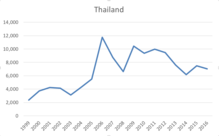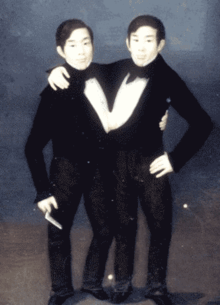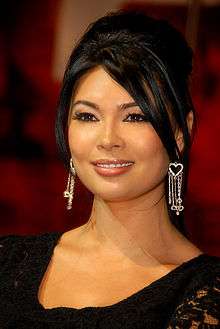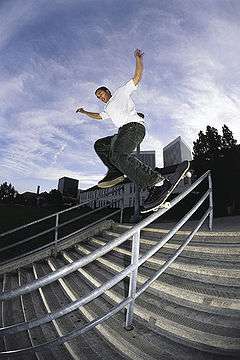Thai Americans
Thai Americans (Thai: ชาวอเมริกันเชื้อสายไทย; formerly referred to as Siamese Americans) are Americans who, or whose ancestors, came from Thailand.[2]
| ||||||||||
| Total population | ||||||||||
|---|---|---|---|---|---|---|---|---|---|---|
| 319,794 (2017 American Community Survey)[1] | ||||||||||
| Regions with significant populations | ||||||||||
| Greater Los Angeles, Northeast, Northern Virginia, Texas, West Coast, Atlanta | ||||||||||
| Languages | ||||||||||
| American English, Isan, Thai | ||||||||||
| Religion | ||||||||||
| Related ethnic groups | ||||||||||
| Thai people, Asian Americans | ||||||||||
History in the US
According to the MPI Data Hub, there are 253,585 Thai people who immigrated to the United States as of 2016, composing 0.0057% of all immigrants that year. In comparing data from the MPI Data Hub to the U.S. Census Bureau, there are significant inconsistencies of total current population. According to the U.S. Census, there are currently 300,319 Thai people living in the Unites States today, with an error margin of +/- 14,326.

Thai immigration to the United States proceeded very slowly. It began in earnest during and after the Vietnam War, in which Thailand was an ally of the US and South Vietnam. Records show that in the decade between 1960 and 1970, some 5,000 Thais immigrated to the United States. In the following decade, the number increased to 44,000. From 1981 to 1990, approximately 64,400 Thai citizens moved to the United States.
The general trend of Thai immigration can be stated at a relatively steady rising pace save for the peak in 2006, which marks the dissolution of the Thai Parliament in February and a subsequent coup in the following September. From 2007-2008, numbers dip back down to regular rate until 2009, which proceeded a year of military and political turmoil due to the disconnect between the monarchic Royal Army and the relatively newly established democratic government in 2006.
According to the 2000 census there were 150,093 Thais in the United States.
In 2009, 304,160 US residents listed themselves as Thais.[3]
Demographics
Los Angeles, California, has the largest Thai population outside of Asia.[4] It is home to the world's first Thai Town. In 2002, it was estimated that over 80,000 Thais and Thai Americans live in Los Angeles. Other large Thai communities are in Clark County, Nevada; Cook County, Illinois; Tarrant County, Texas; Orange County, California; San Bernardino County, California; San Diego County, California; San Francisco, California; Fresno, California; Sacramento, California; King County, Washington; Fairfax County, Virginia; Philadelphia, Pennsylvania; Queens, New York; Seattle, Washington; and Montgomery County, Maryland. The 2010 U.S. census counted 237,629 Thai Americans in the country, of whom 67,707 live in California.[5]
Statistics
- Data from Migration Policy Institute[6]
Thai-born population:
| Year | Number | Margin of error |
|---|---|---|
| 2000 | 169,801 | - |
| 2006 | 186,526 | +10,506 |
| 2007 | 195,948 | +9,668 |
| 2008 | 199,075 | +8,633 |
| 2009 | 203,384 | +8,921 |
| 2010 | 222,759 | +9,960 |
| 2011 | 239,942 | +13,087 |
New legal permanent residents:
| Year | Number |
|---|---|
| 2000 | 3,753 |
| 2001 | 4,245 |
| 2002 | 4,144 |
| 2003 | 3,126 |
| 2004 | 4,318 |
| 2005 | 5,505 |
| 2006 | 11,749 |
| 2007 | 8,751 |
| 2008 | 6,637 |
| 2009 | 10,444 |
| 2010 | 9,384 |
| 2011 | 9,962 |
| 2012 | 9,459 |
| 2013 | 7,583 |
| 2014 | 6,197 |
| 2015 | 7,502 |
| 2016 | 7,039 |
Thais who acquire US citizenship:
| Year | Number |
|---|---|
| 2000 | 5,197 |
| 2001 | 4,088 |
| 2002 | 4,013 |
| 2003 | 3,636 |
| 2004 | 3,779 |
| 2005 | 4,314 |
| 2006 | 4,583 |
| 2007 | 4,438 |
| 2008 | 6,930 |
| 2009 | 4,962 |
| 2010 | 4,112 |
| 2011 | 5,299 |
| 2012 | 6,585 |
| 2013 | 5,544 |
| 2014 | 4,805 |
| 2015 | 5,213 |
| 2016 | 5,211 |
Cultural influence on America
Thai Americans are famous for bringing Thai cooking to the United States. Thai cuisine is popular across the country. Even non-Thai restaurants may include Thai-influenced dishes on their menu.
Thai culture's prominence in the United States is disproportionate to their numbers. The stationing of American troops in Thailand during the Vietnam War exposed the GIs to Thai culture and cuisine, and many of them came home with Thai wives.
Political involvement
Formerly, the Thai American community took no part in politics[when?]. However, with the recent controversy over former prime minister Thaksin Shinawatra, activity in the Thai community increased. Prior to his overthrow, there had been protests against him at the Thai consulate in Los Angeles.
In 2003, two Thai Americans ran in municipal elections, one in Anaheim, California, the other in Houston, Texas. Both lost. However, on November 7, 2006, Gorpat Henry Charoen became the first US official of Thai origin, when he was elected to the La Palma City Council in California. On December 18, 2007, he became the first Thai American mayor of a US city.
In 2010, Charles Djou became the first Thai-American elected to Congress; he had previously served in the Hawaii State House and Honolulu City Council.
Tammy Duckworth, a Thai American Iraq War veteran, ran for Congress as a Democrat in Illinois's 6th district in the 2006 mid-term election. She was narrowly defeated, and served for two years as Assistant Secretary of Public and Intergovernmental Affairs for the United States Department of Veterans Affairs. She was previously the director of the Illinois Department of Veterans Affairs. She was considered a likely nominee for appointment to the United States Senate to fill the vacancy caused by Barack Obama's election to the Presidency of the United States; however, Roland Burris was appointed instead. On November 6, 2012 Duckworth was elected to the US Congress to represent the 8th District of Illinois. On November 8, 2016, she was elected as the junior Senator from Illinois, the seat previously held by Barack Obama.
Bhumibol Adulyadej, the previous King and Head of the State of Thailand, was born at the Mount Auburn Hospital in Cambridge, Massachusetts, on December 5, 1927.[7] At the time, his father was studying at Harvard University. He is the only American-born monarch in history.
Notable people
| Lists of Americans |
|---|
| By U.S. state |
| By ethnicity or nationality |
|
|
|
|
|
|
|
|
|
- Pornthip Nakhirunkanok Simon, Miss Universe 1988
- Allison Sansom, Miss Universe Thailand 2014
- Anthony Ampaipitakwong, professional soccer player
- Todd Angkasuwan, music video and documentary film director
- Chang and Eng Bunker, Siamese twins
- Anthony Burch, writer of video game Borderlands 2
- Amanda Mildred Carr, BMX racer
- Michael Chaturantabut, actor and martial artist
- Cherry Chevapravatdumrong, producer and story editor on Family Guy
- Johnny Damon, MLB player
- Charles Djou, politician
- Tammy Duckworth, politician and military officer
- Myra Molloy, Singer and actress
- Lada Engchawadechasilp, beauty pageant queen
- Kevin Kaesviharn, football player
- Sanit Khewhok, artist
- Eric Koston, professional skater
- Lynn Kriengkrairut, ice dancer
- Nichkhun, singer
- Thakoon Panichgul, fashion designer
- Utt Panichkul, actor, model and VJ
- Ben Parr, author
- John Pippy, politician
- Stacy Prammanasudh, golfer
- Jocelyn Seagrave, television actress
- Alex Sink, former Chief Financial Officer for the state of Florida
- Prim Siripipat, sportscaster
- Brenda Song, actress
- Tamarine Tanasugarn, professional tennis player
- Kevin Tancharoen, dancer, choreographer, television producer and film director
- Maurissa Tancharoen, actress, singer, dancer, television producer/writer and lyricist
- Chrissy Teigen, model, TV host, food blogger
- Traphik or Timothy DeLaGhetto, rapper, comedian, and videographer on YouTube
- Tiger Woods, professional golfer
- Tata Young, singer, actress and former model who lives in Bangkok
- Janie Tienphosuwan, actress
- Prince Gomolvilas, playwright
- Pop Mhan, comic book writer
- Dan Santat, author and winner of the 2015 Caldecott Medal.
- Jet Tila, celebrity chef and restaurateur
See also
Sources
References
- "ASIAN ALONE OR IN ANY COMBINATION BY SELECTED GROUPS". United States Census Bureau. Archived from the original on 11 April 2019. Retrieved 9 October 2018.
- Megan Ratner, "Thai Americans." Gale Encyclopedia of Multicultural America, edited by Thomas Riggs, (3rd ed., vol. 4, Gale, 2014), pp. 357-368. Online
- American Community Survey 2009
- LOS ANGELES CITYWIDE HISTORIC CONTEXT STATEMENT: Context: Thai Americans in Los Angeles, 1950-1980
- America's Only Thai Town Celebrates 15 Years in Los Angeles, June 12, 2014.
- "Migration Data Hub". migrationinformation.org. Retrieved 5 April 2018.
- Times, Barbara Crossette and Special To the New York. "Bangkok Journal; Once Upon a Time a Good King Had 4 Children . . ". nytimes.com. Retrieved 5 April 2018.
Further reading
- Ratner, Megan. "Thai Americans." Gale Encyclopedia of Multicultural America, edited by Thomas Riggs, (3rd ed., vol. 4, Gale, 2014), pp. 357-368. Online
External links
- ThaiNewYork.com
- Thaitown USA News
- Asian Pacific Newspaper
- Siam Media Newspaper
- Sereechai Newspaper
- Yearning to be Free: US Immigration and Thai Sex Workers, Thailand Law Forum, 30 June 2010







.jpg)

